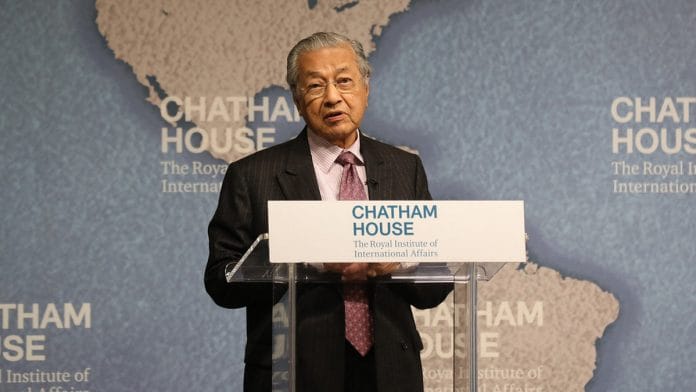Singapore: Mahathir Mohamad may be at least temporarily out of power, but the 94-year-old leader isn’t going down without a fight.
Mahathir’s abrupt resignation last week kicked off a week of horse-trading that saw his fortunes rise and fall by the hour. On Saturday morning, he said he had the numbers to form a government, but by late afternoon the king appointed Muhyiddin Yassin– until recently Mahathir’s right-hand man – as prime minister.
“He is not the right prime minister,” Mahathir said of Muhyiddin on Sunday. “I should have won.”
Mahathir said he had the backing of 114 lawmakers — enough for a majority in Malaysia’s 222-member parliament — even though some he named denied backing him. He’s planning an urgent confidence vote in parliament to show he has the numbers to form a government, and told reporters he felt “betrayed” by Muhyiddin. The new prime minister hasn’t responded publicly to Mahathir’s comments.
No matter how things shake out, it’s a safe bet Mahathir isn’t going anywhere. While he’s ruled Malaysia for nearly a quarter century over two stints, he was perhaps just as active politically when he was retired as he was inside the prime minister’s office — including helping take down former Prime Minister Najib Razak in 2018.
“The game is not over yet,” said James Chin, a Malaysian academic and a political analyst who heads the Asia Institute at the University of Tasmania. “It’s too early to write him off. Mahathir being Mahathir, I doubt he would leave Muhyiddin and Najib with the last laugh.”
Born in 1925 when the Malay Pensinsula was still ruled by Britain, Mahathir studied medicine and became a physician. He became politically active after Japan occupied what is now Malaysia during World War II, and became prime minister for the first time in 1981 at the age of 56 — helming the long-ruling coalition anchored by the United Malays National Organisation, or UMNO.
During his first 22 years in office, Mahathir worked hard to put Malaysia on the world map. He had an affinity for ambitious projects such as the world’s tallest office building, one of the world’s largest dams, and Southeast Asia’s largest airport.
Mahathir’s approach during the Asian Financial Crisis also stood out. In 1997, the Malaysian ringgit plummeted 35 percent, reserves dwindled and the stock market crashed and lost half its value. While other countries such as Thailand scrapped a dollar peg with its currency, Malaysia adopted one in late 1998. Mahathir’s heavy-handed approach worked: Malaysia recovered from the crisis to establish itself as a commodities juggernaut.
The episode also marked his falling out with Anwar Ibrahim, who had served as his deputy in the late 1990s during the Asian financial crisis. After Mahathir fired Anwar in 1998, Anwar spent the next six years in prison on convictions for abuse of power and sodomy. It became a key example for critics who referred to him as a dictator.
Once he left office in 2003, Mahathir never really stopped trying to pull the strings. He orchestrated a campaign to push out his immediate successor, Abdullah Ahmad Badawi, and backed Najib. He subsequently became disillusioned with Najib, particularly over a money laundering scandal involving billions of dollars allegedly siphoned from state investment firm 1MDB.
Mahathir left UMNO in 2016, started a new party with Muhyiddin and aligned with Anwar to pull off a shocking election victory that ousted Najib and Barisan Nasional, the coalition he once led that ruled Malaysia since independence. In power for a second time, Mahathir implemented some reforms, including appointing the country’s first female chief justice and lifting bans on previously blacklisted journalists.
Still, Mahathir didn’t want to commit to a timeline to hand over power to Anwar as promised during the election campaign. The persistent delays in setting an exact date boosted tensions that led to the coalition’s collapse last week.
When Mahathir resigned and was appointed interim leader, it initially appeared like he would return with a strengthened hand. But a series of missteps quickly diminished his support. His bid for a unity government was rejected when he said he wouldn’t accept UMNO as a whole bloc because of some “corrupt” politicians, but would welcome support from individual lawmakers.
His call for lawmakers to vote on March 2 for a new prime minister was blasted by all sides, who saw it as disrespectful as it pre-empted a resolution the monarch was trying to reach. Then he saw his former ruling alliance back Anwar for prime minister, and his party join hands with UMNO to back Muhyiddin.
Seemingly out in the cold, Mahathir surprised again by striking a deal with Anwar’s camp on Saturday morning. He claimed to have the support of a majority in the 222-member parliament, and it looked like he would return as premier. But around 5 p.m. local time, the king said Muhyiddin actually had the support.
Mahathir immediately began convening lawmakers from his coalition to tally up the vote and declared he would write to the king. On Sunday morning, he said the king wouldn’t see him, appearing resigned to the fact that he couldn’t stop Muhyiddin from becoming premier.
“He’s 94 years old — I don’t think he has a long political life in front of him,” said Johan Saravanamuttu, a Malaysian political scientist and adjunct senior fellow at the Rajaratnam School of International Studies. “But you never know with Mahathir.”
Also read: Malaysian PM Mahathir Mohamad closes the book on the boom he launched






